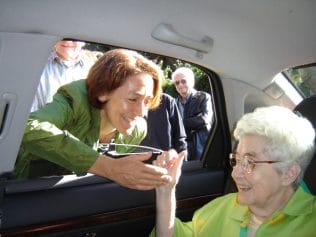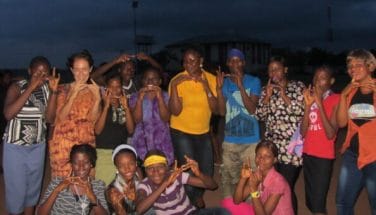Always ready, always available, close to everyone and at the same time able to see the global perspective. A Councillor at the International Centre of the Focolare Movement since 2014, she left this earth on 5th December.

Friederike Koller with the Focolare founder Chiara Lubich
These days, being able to confront and contain horizons that continue to expand, is an essential quality for those who hold managerial positions in international organizations that express the great complexity that characterizes this time. Friederike Koller had this ability. She left us on December 5
th, after a sudden illness. She had a rich life, spent mainly in Europe and Africa, but lived alongside many people from all continents. From 2014 to 2020, Friederike, german focolarina, held the role of Councillor at the International Centre of the Focolare Movement. With Ángel Bartol, she was one of the two “Central Delegates”, that is, the closest collaborators of the President and Co-President of the Movement. They carried out an important and delicate task: to work to maintain the unity of the Focolare communities in the world. A “glocal” assignment, we could say, with ongoing and extremely varied challenges, for which the cultural, social and political diversities demanded a global vision of entire nations, without however neglecting attention for each person. Friederike was a doctor by profession and, as Peter Forst, a German focolarino said, “She was always concerned with healing, never with inflicting new wounds. She listened, she was patient, she let herself be deeply touched by issues, always putting herself on the line, being close to others, not avoiding conflicts, gaining trust: these were some of her great strengths, along with the certain trust of knowing that she was loved by God”. Attention for each person and the desire to give one’s life for something great, characterized Friederike’s choices since she was a young girl: first of all, there was music and dance, because, in her own words, they brought her into “a world that does not pass away, that tastes of eternity”. But, with adolescence came the big questions about the meaning of life. A quest that led her to enrol first of all in the Faculty of Philosophy and then to change her field of study: she chose Medicine because through it, she would be able to help many people and perhaps understand the “secret” of life. A tragic episode then marked a further step towards the discovery of that meaning she was looking for so avidly: the absurd death of a friend, following a serious accident, paradoxically opened up a passage to the presence of God within her and to a first conversation with him. “For the first time”, she said, “that God that I felt was only a “judge” became life, beauty, harmony”. In this way she discovered in him the truth she had so ardently sought. Friederike’s first contact with the spirituality of the Focolare coincided with the discovery of a “possible” and practicable Gospel. She said, “My individualistic conception of thinking and doing fell away and slowly I began to look at the people around me as true brothers and sisters, trusting in the Father’s love for each one”. Life became intense and rich: at work, with young people, helping the poorest. “Inside, I felt a desire for total donation to God; at the same time I was terribly afraid of losing my freedom”. In that period she learned more about Mary, the mother of Jesus: “One day I remembered that ‘Yes’ she had said against all human reason, despite all the fears that she too felt. And so she gave me the courage to say my ‘Yes’ too”. After the school for focolarine in Loppiano (Italy), she returned to live in Germany, first in Cologne and then in Solingen. She worked as a doctor for fifteen years, which she later defined as “a school of humanity, of sharing, of humility and of profound respect, in the face of the lives of so many people with unimaginable challenges”.

Friederike with young people in Nigeria
In 2010, the Focolare Movement needed a focolarina to take on the responsibility for Nigeria, in a difficult moment because of the social situation of the country and the increase of terrorist incidents. Friederike, who was then co-responsible for the Focolare in north-western Germany, did not ask others, but offered to go there herself. The focolarine from Nigeria recall, “She truly loved the people of Nigeria, with its enormous geographical, ethnic and religious challenges. She knew how to share our wounds, she followed every situation to the end. She accompanied us and encouraged us to always choose the least”. She had a preferential love for those who are discarded, poor, forgotten, combined with an attention to anyone who passed her way and this never changed, even when she held an important position. Every fortnight, with a silent and almost hidden service, she volunteered at the “Centro Astalli” in Rome, which welcomes and accommodates immigrant women. She made dinner and if necessary, helped clean up the kitchen. Sometimes, a conversation was struck up with the residents of the Centre, and in some cases her experience as a doctor was precious. She would stay up until the last person returned, often late at night. Then, early next morning, she would go back to Rocca di Papa, arriving directly to work at the International Centre of the Focolare. She also lived the daily life of community with simplicity and naturalness. “She did everything with great care. With her, it was very difficult to love first, inevitably you always arrived second…”. For Conleth Burns, a young Irishman who worked with Friederike on the Pathways project, it was a gift to get to know her: “She was always ready, available, close at hand, able to see the picture in a global perspective. For her, unity was always both: large and small, daily and strategic, personal and social. I think the best way we can remember her is to follow her example and live it fully”.
Anna Lisa Innocenti and Stefania Tanesini






0 Comments